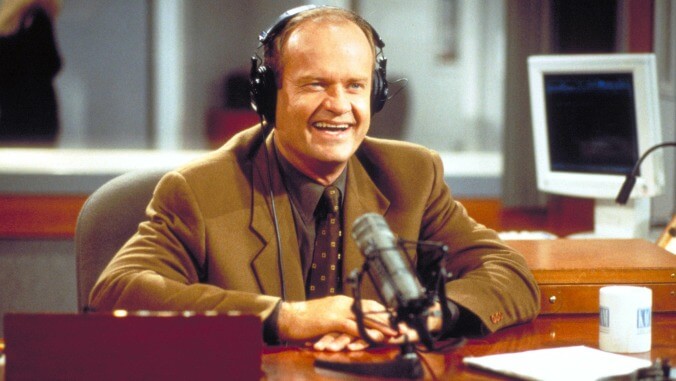Why the hell do we still care about Frasier Crane?
As Kelsey Grammer prepares to revive his most famous character for a third TV show, we have one question: Him?

Last month marked the 39th anniversary of the debut of Frasier Crane, a character whom Kelsey Grammer has now been playing, with some notable gaps, for more than half of his total time on Earth. This month, meanwhile, marks the end of one such lacuna, as Paramount+ releases the second TV show to bear the name Frasier and the third to feature Grammer as the character in a starring role. Returning to the world as a much older man, the new Frasier carries at least a whiff of the old one, with Dr. Crane arriving in a new-old town (his former Cheers stomping ground of Boston) to address a broken father-son relationship—this time, with his own adult son, Frederick (Jack Cutmore-Scott). Trailers for the show suggest that the series will follow at least some of the rhythms of the original, with a whole new generation of friends and family members lovingly having the crap annoyed out of them by one of TV’s most dedicated snobs.
Which raises the question: What, exactly, is it about this obnoxious, pretentious, condescending asshole that we all like so much? Paramount+ clearly believes there’s enough fan enthusiasm out in the ether to support Grammer’s long-held dreams of a reboot, and anecdotal evidence—the Frasier binge being a regular step on many an online addict’s streaming pilgrimage—suggests they might be right. Because the fact is that, even if Frasier himself is rarely its best part (something that doesn’t bode all that well for a reboot where he’s the only returning main character, by the by), Frasier remains a shockingly good example of the sitcom form. Strip off years of stereotyping and assumptions, complaints about the dog, Grammer’s own baggage, and more, and it’s still a show that resonates with people almost 20 years after its much-loved finale first aired.
So, let’s look back at a show that averaged more than three Emmy wins per season for a staggering 11 years, and which is apparently still so potent that it can bring tossed salads and scrambled eggs back to the people nearly two decades after the fact. Why this show? Why this guy? Why do Frasier, and Frasier, persist?
A matter of character
Sitcoms live and die on character. Jokes come and go, wacky situations are a dime a dozen, but character dynamics power everything. And the first Frasier established a doozy in its opening episode, “The Good Son,” which wastes little time in sketching out the complicated relationship between Frasier, his brother Niles (David Hyde Pierce), and his blue-collar, retired cop father, Martin (the late, and brilliant, John Mahoney). Things are initially so tense, and so ugly, between Frasier and his dad that a later retcon, meant to spackle over the fact that Frasier told his Cheers barmates that his dad was dead back during that show’s run, makes a surprising amount of sense: Given the friction between the pompous ass and the tough-as-nails detective in the show’s more grounded first season, is it any wonder that Frasier lied about being an orphan? The show would occasionally reduce the Frasier-Martin dynamic to a simpler Odd Couple vibe, but Mahoney, especially, could mine real feeling out of Martin’s bewilderment, and sometimes shame, at the way his son would act.
Niles, meanwhile, was a serendipitous masterstroke, having only been conceived of as a character after the show’s producers saw a headshot of Pierce, and noted his resemblance to Grammer. In building the character, series creators David Angell, Peter Casey, and David Lee created someone who could, essentially, out-Frasier Frasier: more neurotic, more snooty, and frequently more cutting, all in the hands of a performer who could handle anything you cared to throw at him. (It’s no shock that Pierce was nominated for the Emmy for Best Supporting Actor In A Comedy every single year Frasier was on the air, winning three times.) Playing friend, confidante, rival, wounded little brother, and ultimately serving as the show’s actual romantic lead, Pierce could deliver complicated multi-lingual wordplay one moment, and one of TV’s all-time-great physical comedy scenes the next.
Really, though, all of the main Frasier characters share a key trait: an ability to out-maneuver their leading man. Jane Leeves’ housekeeper/physical therapist Daphne could cheerfully blow off her boss’ pompous rage. Peri Gilpin’s Roz, a force of nature and a union woman, got the best of him almost constantly. None of which is to discount Grammer’s own good work, inhabiting this version of Frasier (more snobby and pompous than the one he played on Cheers, but still recognizably the same guy) with total commitment. But all involved seemed to grasp that the joys of Frasier came in taking a man who considered himself the urbane, composed master of the universe, and then slamming him, full-force, into characters with no interest in taking his shit.
 Keep scrolling for more great stories.
Keep scrolling for more great stories.
